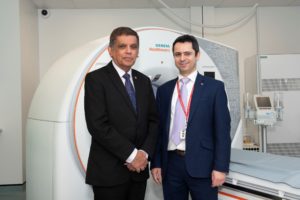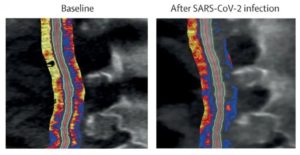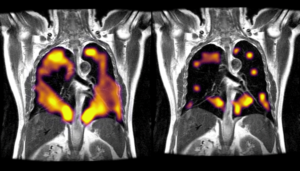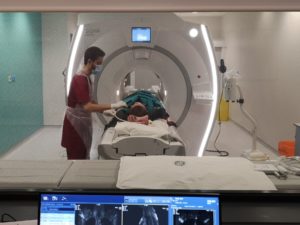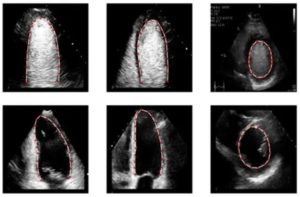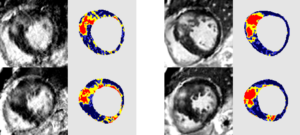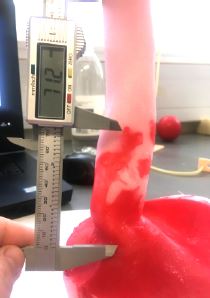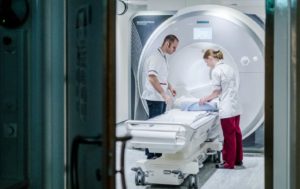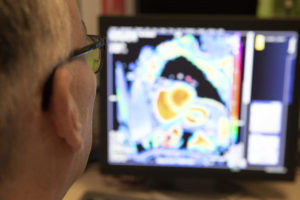Researchers from the Universities of Oxford and Nottingham have developed a new tool that can identify the people most at risk of developing lung cancer over the next 10 years, and put them forward for screening tests earlier, saving time, money and, most importantly, lives. The researchers ... READ MORE
News for Imaging
New imaging centre officially opened
A new Acute Multidisciplinary Imaging and Interventional Centre (AMIIC), based at the John Radcliffe Hospital, has been officially opened. AMIIC, part of the University of Oxford’s Radcliffe Department of Medicine, was previously known as AVIC (Acute Vascular Imaging Centre). The newly ... READ MORE
Study develops radiotranscriptomic AI analysis to enable virtual heart biopsies
Oxford University researchers have found a new way of directly quantifying vascular inflammation in COVID-19 patients, in a study that could pave the way to more efficient trials of new treatments and identify patients who might be at risk of long-term complications. The study, which was ... READ MORE
Moderate drinking linked to brain changes and cognitive decline
Consumption of seven or more units of alcohol per week is associated with higher levels of iron in the brain, according to a study by Oxford researchers. Accumulation of iron in the brain has been linked with Alzheimer’s and Parkinson’s diseases and is a potential mechanism for alcohol-related ... READ MORE
OUH agrees long COVID research collaboration with Polarean
Oxford University Hospitals (OUH) and the medical imaging technology company, Polarean Imaging plc, have entered into a research collaboration to study the long-term effects of COVID-19 in patients who are still experiencing breathlessness months after infection. Polarean produce an ... READ MORE
Review highlights impact of Long COVID on cardiovascular system
The wide-ranging effects of long COVID and the associated issues for healthcare providers have been revealed in a new review of the major studies into the condition, which specifically highlights the impact of long COVID on the cardiovascular system. The review, published in the European Heart ... READ MORE
Lung abnormalities found in long COVID patients with breathlessness
Researchers have identified abnormalities in the lungs of long COVID patients who are experiencing breathlessness that cannot be detected with routine tests. The EXPLAIN study, which involves teams in Oxford, Sheffield, Cardiff and Manchester, is using hyperpolarised xenon MRI scans to ... READ MORE
Doctors making AI-assisted decisions more accurate and confident in decision-making
New research has shown that doctors who use an artificial intelligence (AI) algorithm to assess echocardiograms are more accurate and more confident in their decision making. The study, published in the journal JACC Cardiovascular Imaging, is the first to show that an algorithm can ... READ MORE
People with long COVID after hospitalisation face limited recovery after one year
People who were hospitalised with COVID-19 and continued to experience symptoms five months later show limited further recovery one year after hospital discharge, according to the latest results of a major national study looking at the long-term health impacts of COVID-19 on hospitalised ... READ MORE
Oxford studies benefit from government funding of long COVID research
Thousands of people suffering with long COVID will benefit from new research programmes backed by £19.6 million to help better understand the condition, improve diagnosis and find new treatments. Among the 15 studies that will receive government funding through the National Institute for Health ... READ MORE
AI replaces contrast dye for fast, cheaper and needle-free cardiac MRI scans
A team from Oxford comprising artificial intelligence (AI) scientists, magnetic resonance specialists and cardiologists have developed a new cardiac magnetic resonance (CMR) scan for detecting heart muscle disease. The current ‘gold standard’ for imaging heart muscle disease is CMR, using a ... READ MORE
New Senior Research Fellows named
The NIHR Oxford BRC has announced the appointment of its latest group of Senior Research Fellows – the third cohort of emerging research leaders to receive the accolade. Like in 2020, this year’s selection process was a coordinated effort by the Oxford BRC and its partners in the NIHR ... READ MORE
AI endoscopy enables 3D surface measurements of pre-cancerous condition in oesophagus
Clinicians and engineers in Oxford have begun using artificial intelligence alongside endoscopy to get more accurate readings of the pre-cancerous condition Barrett’s oesophagus and so determine patients most at risk of developing cancer. In a research paper published in the journal ... READ MORE
Artificial intelligence tool for streamlining pathology workflow
A multidisciplinary team comprising University of Oxford academics and Oxford University Hospitals (OUH) pathologists has developed an algorithm that automates requests for additional investigation of diagnostically uncertain prostate biopsies. The team were supported by the NIHR Oxford BRC ... READ MORE
Study confirms longer-term lung damage after COVID-19
A study by Oxford and Sheffield researchers using a cutting-edge method of imaging has identified persistent damage to the lungs of COVID-19 patients at least three months after they were discharged from hospital, and for some patients even longer. This damage was not detected by routine CT ... READ MORE
Having a healthier heart associated with better problem-solving and reaction time
People with healthier heart structure and function appear to have better cognitive abilities, including increased capacity to solve logic problems and faster reaction times, according to a study involving University of Oxford and Queen Mary University of London (QMUL) researchers. The study, ... READ MORE
Seven in ten patients hospitalised with COVID-19 not fully recovered five months after discharge
A majority of survivors who left hospital following COVID-19 had not fully recovered five months after discharge and continued to experience negative impacts on their physical and mental health, as well as their ability to work, according to results released by a major national study into the ... READ MORE
Oxford study confirms medium-term impact of COVID-19
A study looking at the longer-term impact of COVID-19 has found that a significant proportion of COVID-19 patients discharged from hospital reported symptoms of breathlessness, fatigue and depression and had limited exercise capacity several weeks after leaving hospital. The University of ... READ MORE
Hidden lung damage from COVID-19 revealed in new study
Early findings from a study into longer-term damage in patients recovering from COVID-19 suggest that cutting-edge scanning techniques may detect previously unseen lung damage. The research by the universities of Oxford and Sheffield is the first in Europe to use hyperpolarised Xenon gas with MRI ... READ MORE
Oxford study reveals medium-term impact of COVID-19
Initial findings from a study looking at the longer-term impact of COVID-19 have shown that a large proportion of COVID-19 patients discharged from hospital were still experiencing symptoms of breathlessness, fatigue, anxiety and depression two to three months after contracting the virus. The ... READ MORE

